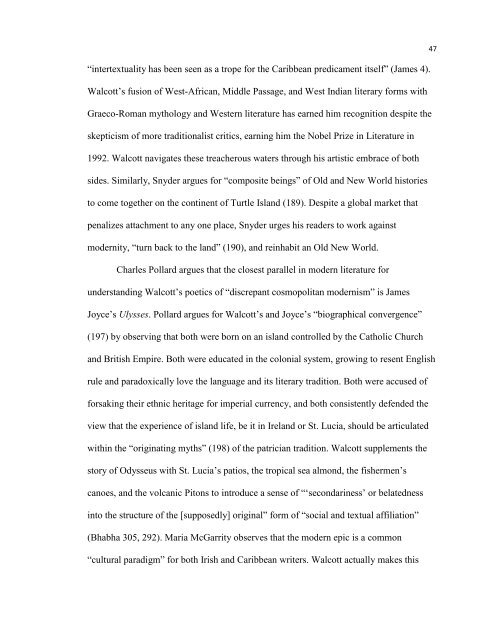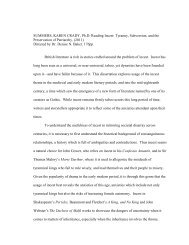RE-INHABITING THE ISLANDS - The University of North Carolina at ...
RE-INHABITING THE ISLANDS - The University of North Carolina at ...
RE-INHABITING THE ISLANDS - The University of North Carolina at ...
You also want an ePaper? Increase the reach of your titles
YUMPU automatically turns print PDFs into web optimized ePapers that Google loves.
―intertextuality has been seen as a trope for the Caribbean predicament itself‖ (James 4).<br />
Walcott‘s fusion <strong>of</strong> West-African, Middle Passage, and West Indian literary forms with<br />
Graeco-Roman mythology and Western liter<strong>at</strong>ure has earned him recognition despite the<br />
skepticism <strong>of</strong> more traditionalist critics, earning him the Nobel Prize in Liter<strong>at</strong>ure in<br />
1992. Walcott navig<strong>at</strong>es these treacherous w<strong>at</strong>ers through his artistic embrace <strong>of</strong> both<br />
sides. Similarly, Snyder argues for ―composite beings‖ <strong>of</strong> Old and New World histories<br />
to come together on the continent <strong>of</strong> Turtle Island (189). Despite a global market th<strong>at</strong><br />
penalizes <strong>at</strong>tachment to any one place, Snyder urges his readers to work against<br />
modernity, ―turn back to the land‖ (190), and reinhabit an Old New World.<br />
Charles Pollard argues th<strong>at</strong> the closest parallel in modern liter<strong>at</strong>ure for<br />
understanding Walcott‘s poetics <strong>of</strong> ―discrepant cosmopolitan modernism‖ is James<br />
Joyce‘s Ulysses. Pollard argues for Walcott‘s and Joyce‘s ―biographical convergence‖<br />
(197) by observing th<strong>at</strong> both were born on an island controlled by the C<strong>at</strong>holic Church<br />
and British Empire. Both were educ<strong>at</strong>ed in the colonial system, growing to resent English<br />
rule and paradoxically love the language and its literary tradition. Both were accused <strong>of</strong><br />
forsaking their ethnic heritage for imperial currency, and both consistently defended the<br />
view th<strong>at</strong> the experience <strong>of</strong> island life, be it in Ireland or St. Lucia, should be articul<strong>at</strong>ed<br />
within the ―origin<strong>at</strong>ing myths‖ (198) <strong>of</strong> the p<strong>at</strong>rician tradition. Walcott supplements the<br />
story <strong>of</strong> Odysseus with St. Lucia‘s p<strong>at</strong>ios, the tropical sea almond, the fishermen‘s<br />
canoes, and the volcanic Pitons to introduce a sense <strong>of</strong> ―‗secondariness‘ or bel<strong>at</strong>edness<br />
into the structure <strong>of</strong> the [supposedly] original‖ form <strong>of</strong> ―social and textual affili<strong>at</strong>ion‖<br />
(Bhabha 305, 292). Maria McGarrity observes th<strong>at</strong> the modern epic is a common<br />
―cultural paradigm‖ for both Irish and Caribbean writers. Walcott actually makes this<br />
47
















